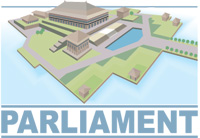Columns
The National Govt.’s resolve to disagree constitutes anything but bipartisanship
View(s):While matters in Parliament calmed down to some extent this week, with the “joint opposition” winning its demand to function as a separate Group in the Legislature, failure of the House to agree on a Resolution to set up a Constitutional Assembly for the drafting of a new Constitution, once again brought to light the volatility of the government of cohabitation between the UNP and the SLFP.
 The Resolution presented to Parliament by Prime Minister Ranil Wickremesinghe in early January, was debated for two days this week, but will once again be placed before Cabinet before its put to a vote in the House. The Prime Minister said there was general consensus on the Resolution, but some issues still needed to be ironed out. The SLFP has proposed several amendments including removing the word “new’ from the sentence, “there is broad agreement among the people of Sri Lanka that it is necessary to enact a new Constitution”.
The Resolution presented to Parliament by Prime Minister Ranil Wickremesinghe in early January, was debated for two days this week, but will once again be placed before Cabinet before its put to a vote in the House. The Prime Minister said there was general consensus on the Resolution, but some issues still needed to be ironed out. The SLFP has proposed several amendments including removing the word “new’ from the sentence, “there is broad agreement among the people of Sri Lanka that it is necessary to enact a new Constitution”.
The SLFP had also proposed that the entire preamble to the Resolution, which includes a part on providing for a “Constitutional resolution of the national issue”, be removed, a move opposed by the Tamil National Alliance (TNA). Views expressed by members of different parties during the two-day debate also amply illustrated that differences exist on what should be prioritised when drafting a new Constitution.
Two senior SLFP remembers, both Government ministers, Nimal Siripala De Silva and John Seneviratne, emphasised the need to change the electoral system, saying it was the most pressing need. “The Constitution-making process should give priority to the introduction of a new electoral system. The system should enable the people to elect a stable government, as well as give adequate representation to minorities,” Minister De Silva said. Minister Seneviratne too emphasised on the need to do away with the Proportional Representation (PR) electoral system.
This was in sharp contrast to the views expressed by several UNP legislators including State Minister Sujeewa Senasinghe who strongly disagreed that a change in the electoral system should be the main focus and that, the priority should be the resolution to the national question. “If we do not address the national issue, all other attempts at changing the Constitution will fail,” he warned.
The decision of the Government to delay a vote on their Resolution, which was first presented to the House in early January, drew criticism from the JVP. Its MP Sunil Handunnetti said that the delay showed the Government lacks genuine commitment to have it passed.
“If we spend so much time just debating the Resolution on setting up of the body that will be entrusted with drafting a new Constitution, we can imagine how long the drafting process will take,” he said.
Opposition Leader and TNA parliamentarian R. Sampanthan asked everyone to cooperate to have the Resolution passed soon. “Everybody in this country has been campaigning for the abandonment of the 1978 Constitution. What we should do now is to try and ensure that this Resolution be adopted by Parliament and that we commence the business of creating a new Constitution” he said.
Meanwhile the “joint Opposition” headed by MP Dinesh Gunawardena seemed appeased for now by Speaker Karu Jayasuriya’s decision to allow the Group to be represented at party leaders meetings on parliamentary business, more time to speak in the House, as well as raise one adjournment question per sitting week.
It was also decided that the Group would be allowed to raise questions under Standing Order 23/2 of Parliament, a prerogative of the Leader of the Opposition, Chief Opposition Whip or a party leader recognised by the Speaker. The issue pertaining to 23/ 2 was resolved with the intervention of President Maithripala Sirisena and Prime Minister Ranil Wickremesinghe.
The decision in their favour has for now made the “joint Opposition” conciliatory towards the Government, but with the controversial Economic and Technology Cooperation Agreement (ETCA) with India looming large, things will get stormy in the House in the months ahead, as the newly anointed unofficial Opposition group will up the ante, invigorated by its new found clout, enjoying equal status as the officially recognised Opposition.


Leave a Reply
Post Comment